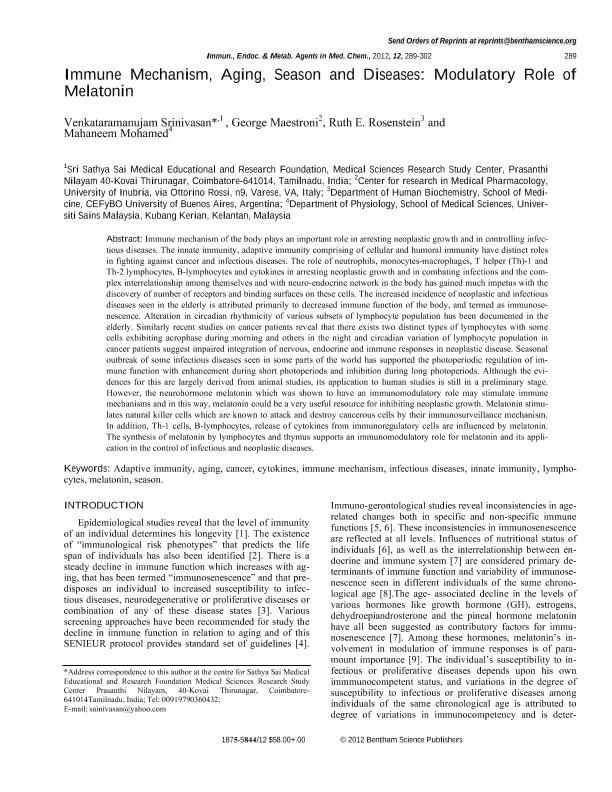Mostrar el registro sencillo del ítem
dc.contributor.author
Srinivasan, Venkataramanujam
dc.contributor.author
Maestroni, George
dc.contributor.author
Rosenstein, Ruth Estela

dc.contributor.author
Mohamed, Mahaneem
dc.date.available
2017-07-12T22:14:37Z
dc.date.issued
2012-12
dc.identifier.citation
Srinivasan, Venkataramanujam; Maestroni, George; Rosenstein, Ruth Estela; Mohamed, Mahaneem; Immune mechanism, aging, season and diseases: modulatory role of melatonin; Bentham Science Publishers; Immunology, Endocrine & Metabolic Agents in Medicinal Chemistry; 12; 4; 12-2012; 289-302
dc.identifier.issn
1871-5222
dc.identifier.uri
http://hdl.handle.net/11336/20319
dc.description.abstract
Immune mechanism of the body plays an important role in arresting neoplastic growth and in controlling infectious diseases. The innate immunity, adaptive immunity comprising of cellular and humoral immunity have distinct roles in fighting against cancer and infectious diseases. The role of neutrophils, monocytes-macrophages, T helper (Th)-1 and Th-2 lymphocytes, B-lymphocytes and cytokines in arresting neoplastic growth and in combating infections and the complex interrelationship among themselves and with neuro-endocrine network in the body has gained much impetus with the discovery of number of receptors and binding surfaces on these cells. The increased incidence of neoplastic and infectious diseases seen in the elderly is attributed primarily to decreased immune function of the body, and termed as immunosenescence. Alteration in circadian rhythmicity of various subsets of lymphocyte population has been documented in the elderly. Similarly recent studies on cancer patients reveal that there exists two distinct types of lymphocytes with some cells exhibiting acrophase during morning and others in the night and circadian variation of lymphocyte population in cancer patients suggest impaired integration of nervous, endocrine and immune responses in neoplastic disease. Seasonal outbreak of some infectious diseases seen in some parts of the world has supported the photoperiodic regulation of immune function with enhancement during short photoperiods and inhibition during long photoperiods. Although the evidences for this are largely derived from animal studies, its application to human studies is still in a preliminary stage. However, the neurohormone melatonin which was shown to have an immunomodulatory role may stimulate immune mechanisms and in this way, melatonin could be a very useful resource for inhibiting neoplastic growth. Melatonin stimulates natural killer cells which are known to attack and destroy cancerous cells by their immunosurveillance mechanism. In addition, Th-1 cells, B-lymphocytes, release of cytokines from immunoregulatory cells are influenced by melatonin. The synthesis of melatonin by lymphocytes and thymus supports an immunomodulatory role for melatonin and its application in the control of infectious and neoplastic diseases.
dc.format
application/pdf
dc.language.iso
eng
dc.publisher
Bentham Science Publishers

dc.rights
info:eu-repo/semantics/openAccess
dc.rights.uri
https://creativecommons.org/licenses/by-nc-sa/2.5/ar/
dc.subject
Adaptive Immunity
dc.subject
Aging
dc.subject
Cancer
dc.subject
Cytokines
dc.subject
Immune Mechanism
dc.subject
Infectious Diseases
dc.subject
Innate Immunity
dc.subject
Lymphocytes
dc.subject
Melatonin
dc.subject
Season
dc.subject.classification
Inmunología

dc.subject.classification
Medicina Básica

dc.subject.classification
CIENCIAS MÉDICAS Y DE LA SALUD

dc.title
Immune mechanism, aging, season and diseases: modulatory role of melatonin
dc.type
info:eu-repo/semantics/article
dc.type
info:ar-repo/semantics/artículo
dc.type
info:eu-repo/semantics/publishedVersion
dc.date.updated
2017-07-11T19:45:59Z
dc.identifier.eissn
1875-6115
dc.journal.volume
12
dc.journal.number
4
dc.journal.pagination
289-302
dc.journal.pais
Emiratos Árabes Unidos

dc.journal.ciudad
Sharjah
dc.description.fil
Fil: Srinivasan, Venkataramanujam. Medical Sciences Research Study Center. Sri Sathya Sai Medical Educational and Research Foundation; India
dc.description.fil
Fil: Maestroni, George. University of Inubria; Italia
dc.description.fil
Fil: Rosenstein, Ruth Estela. Consejo Nacional de Investigaciones Científicas y Técnicas. Oficina de Coordinación Administrativa Houssay. Centro de Estudios Farmacológicos y Botánicos. Universidad de Buenos Aires. Facultad de Medicina. Centro de Estudios Farmacológicos y Botánicos; Argentina
dc.description.fil
Fil: Mohamed, Mahaneem. University Sains Malaysia; Malasia
dc.journal.title
Immunology, Endocrine & Metabolic Agents in Medicinal Chemistry
dc.relation.alternativeid
info:eu-repo/semantics/altIdentifier/url/http://www.eurekaselect.com/103761/article
dc.relation.alternativeid
info:eu-repo/semantics/altIdentifier/doi/http://dx.doi.org/10.2174/187152212803520995
Archivos asociados
